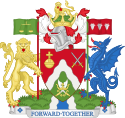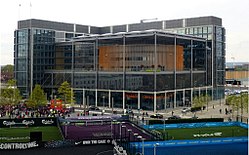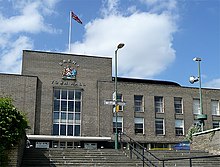Brent London Borough Council
Brent London Borough Council | |
|---|---|
| Whole council elected every four years | |
 | |
 Council logo | |
| Type | |
| Type | |
| Leadership | |
Kim Wright since May 2023[3] | |
| Structure | |
| Seats | 57 councillors |
 | |
Political groups |
|
| Elections | |
| First past the post | |
Last election | 5 May 2022 |
Next election | 7 May 2026 |
| Meeting place | |
 | |
| Brent Civic Centre, Engineers Way, Wembley, HA9 0FJ | |
| Website | |
| www | |
Brent London Borough Council, also known as Brent Council, is the local authority for the London Borough of Brent in Greater London, England. It is a London borough council, one of 32 in London. The council has been under Labour majority control since 2010. It is based at Brent Civic Centre in Engineers Way, Wembley.
History[edit]
The borough was created in 1965 under the London Government Act 1963, covering the combined area of the former Municipal Borough of Wembley and the Municipal Borough of Willesden. The area was transferred from Middlesex to Greater London to become one of the 32 London Boroughs.[4] The council's full legal name is the "Mayor and Burgesses of the London Borough of Brent", although it styles itself Brent Council.[5]
From 1965 until 1986 the council was a lower-tier authority, with upper-tier functions provided by the Greater London Council. The split of powers and functions meant that the Greater London Council was responsible for "wide area" services such as fire, ambulance, flood prevention, and refuse disposal; with the boroughs (including Brent) responsible for "personal" services such as social care, libraries, cemeteries and refuse collection. As an outer London borough council Brent has been a local education authority since 1965. The Greater London Council was abolished in 1986 and its functions passed to the London Boroughs, with some services provided through joint committees.[6]
Since 2000 the Greater London Authority has taken some responsibility for highways and planning control from the council, but within the English local government system the council remains a "most purpose" authority in terms of the available range of powers and functions.[7]
On Valentine's Day in 2016, the Council launched its ‘Love Where You Live’ campaign, an initiative which encouraged local people to work alongside the Council and make Brent a better, happier place to live. Groups such as Kensal Green Streets, Harlesden Environmental Action Residents, Northwest TWO and Keep Wembley Tidy all took action as a result of the campaign.[8] In June 2016, a short, community-based documentary called ‘Stories of Brent’ was produced, based on the campaign, starring Audley Harrison, Rachel Yankey and Liz Mitchell from Boney M.[9] Brent was the London Borough of Culture in 2020, receiving £1.35m of funding under a new initiative launched by the Mayor of London, Sadiq Khan.[10]
Governance[edit]
The local authority derives its powers and functions from the London Government Act 1963 and subsequent legislation, and has the powers and functions of a London borough council. It sets council tax and as a billing authority also collects precepts for Greater London Authority functions and business rates.[11] It sets planning policies which complement Greater London Authority and national policies, and decides on almost all planning applications accordingly. It is a local education authority and is also responsible for council housing, social services, libraries, waste collection and disposal, traffic, and most roads and environmental health.[12]
Political control[edit]
The council has been under Labour majority control since 2010.
The first election to the council was held in 1964, initially operating as a shadow authority alongside the outgoing authorities until the new arrangements came into effect on 1 April 1965. Political control of the council since 1965 has been as follows:[13][14]
| Party in control | Years | |
|---|---|---|
| Labour | 1965–1968 | |
| Conservative | 1968–1971 | |
| Labour | 1971–1982 | |
| No overall control | 1982–1986 | |
| Labour | 1986–1990 | |
| No overall control | 1990–1998 | |
| Labour | 1998–2006 | |
| No overall control | 2006–2010 | |
| Labour | 2010–present | |
Leadership[edit]
The role of mayor is largely ceremonial in Brent. Political leadership is instead provided by the leader of the council. The leaders since 1965 have been:[15][16][17]
| Councillor | Party | From | To | |
|---|---|---|---|---|
| George Swannell[18][19] | Labour | 1965 | 1968 | |
| Edwin Lee | Conservative | 1968 | 1971 | |
| Philip Hartley | Labour | 1971 | 1977 | |
| James Goudie | Labour | 1977 | 1978 | |
| John Lebor | Labour | 1978 | 1981 | |
| Tom Bryson | Labour | 1981 | 1983 | |
| Martin Coleman | Labour | 1983 | 1986 | |
| Merle Amory | Labour | 1986 | 1988 | |
| Dorman Long | Labour | 1988 | 1990 | |
| Bob Blackman | Conservative | 1990 | 1996 | |
| Paul Daisley | Labour | Apr 1996 | 2001 | |
| Ann John | Labour | 2001 | May 2006 | |
| Paul Lorber | Liberal Democrats | 26 Jun 2006 | 26 May 2010 | |
| Ann John | Labour | 26 May 2010 | May 2012 | |
| Muhammed Butt | Labour | 16 May 2012 | ||
Composition[edit]
Following the 2022 election the composition of the council was:
| Party | Councillors | |
|---|---|---|
| Labour | 49 | |
| Conservative | 5 | |
| Liberal Democrats | 3 | |
| Total | 57 | |
The next election is due in 2026.
Premises[edit]

The council is based at Brent Civic Centre on Engineers Way in the Wembley Park area of the borough. The building was purpose-built for the council and opened in 2013.[20] Prior to 2013 the council was based at Brent Town Hall, on Forty Lane in Wembley, which had been completed in 1940 for the old Wembley Borough Council, originally being called Wembley Town Hall.[21]
Elections[edit]
Since the last boundary changes in 2022 the council has comprised 57 councillors representing 22 wards, with each ward electing two or three councillors. Elections are held every four years.[22]
See also[edit]
References[edit]
- ^ "Council minutes, 17 May 2023". Brent Council. Retrieved 18 July 2023.
- ^ "Council minutes, 4 June 2014". Brent Council. Retrieved 18 July 2023.
- ^ "How the council is structured". Brent Council. Retrieved 18 July 2023.
- ^ Youngs, Frederic (1979). Guide to the Local Administrative Units of England. Vol. I: Southern England. London: Royal Historical Society. ISBN 0-901050-67-9.
- ^ "Service Level Agreement, 2020" (PDF). Harrow Council. Retrieved 2 May 2024.
- ^ "Local Government Act 1985", legislation.gov.uk, The National Archives, 1985 c. 51, retrieved 5 April 2024
- ^ Leach, Steve (1998). Local Government Reorganisation: The Review and its Aftermath. Routledge. p. 107. ISBN 978-0714648590.
- ^ "Love where you live - Brent Council". www.brent.gov.uk.
- ^ "YouTube". www.youtube.com.
- ^ "Waltham Forest & Brent crowned first-ever London Boroughs of Culture". London City Hall. 27 February 2018.
- ^ "Council Tax and Business Rates Billing Authorities". Council Tax Rates. Retrieved 8 April 2020.
- ^ "Local Plan Responses – within and outside London". Mayor of London. 12 November 2015. Retrieved 9 April 2020.
- ^ "Compositions calculator". The Elections Centre. Retrieved 3 March 2023.
- ^ "Brent". BBC News Online. 19 April 2009. Retrieved 8 May 2010.
- ^ "Council minutes". Brent Council. Retrieved 4 July 2022.
- ^ "London Boroughs Political Almanac". London Councils. Retrieved 4 July 2022.
- ^ Passmore, Michael (2015). The responses of Labour-controlled London local authorities to major changes in housing policy, 1971–1973 (PDF). London: King's College London. p. 280. Retrieved 6 July 2022.
- ^ "World Cup Committee". Harrow Observer. 30 December 1965. p. 22. Retrieved 6 July 2022.
...the leader of the Council, Cllr. G. B. Swannell...
- ^ "Mirror complains to Press Council". Daily Mirror. 5 May 1967. p. 2. Retrieved 6 July 2022.
...Councillor George Swannell, leader of the council...
- ^ "Brent's new civic centre opens". ITV. 6 October 2013. Retrieved 15 November 2020.
- ^ Historic England. "Brent Town Hall (Grade II) (1262141)". National Heritage List for England. Retrieved 2 May 2024.
- ^ "The London Borough of Brent (Electoral Changes) Order 2020", legislation.gov.uk, The National Archives, SI 2020/66, retrieved 2 May 2024
